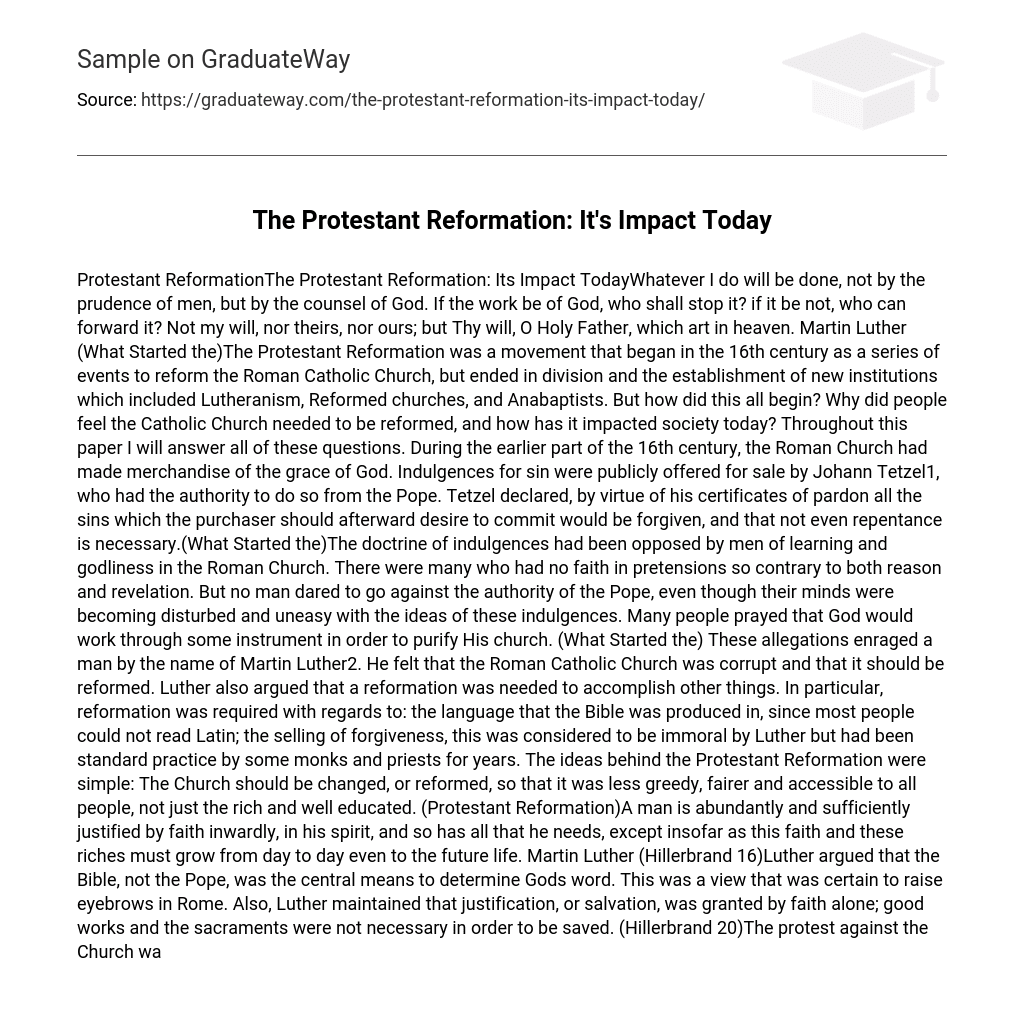Whatever I do will be done, not by the prudence of men, but by the counsel of God. If the work be of God, who shall stop it? if it be not, who can forward it? Not my will, nor theirs, nor ours; but Thy will, O Holy Father, which art in heaven.
The Protestant Reformation was a movement that began in the 16th century as a series of events to reform the Roman Catholic Church, but ended in division and the establishment of new institutions which included Lutheranism, Reformed churches, and Anabaptists. But how did this all begin? Why did people feel the Catholic Church needed to be reformed, and how has it impacted society today?
Throughout this paper I will answer all of these questions. During the earlier part of the 16th century, the Roman Church had made merchandise of the grace of God. Indulgences for sin were publicly offered for sale by Johann Tetzel1, who had the authority to do so from the Pope. Tetzel declared, by virtue of his certificates of pardon all the sins which the purchaser should afterward desire to commit would be forgiven, and that not even repentance is necessary.
The doctrine of indulgences had been opposed by men of learning and godliness in the Roman Church. There were many who had no faith in pretensions so contrary to both reason and revelation. But no man dared to go against the authority of the Pope, even though their minds were becoming disturbed and uneasy with the ideas of these indulgences. Many people prayed that God would work through some instrument in order to purify His church.
These allegations enraged a man by the name of Martin Luther2. He felt that the Roman Catholic Church was corrupt and that it should be reformed. Luther also argued that a reformation was needed to accomplish other things. In particular, reformation was required with regards to: the language that the Bible was produced in, since most people could not read Latin; the selling of forgiveness, this was considered to be immoral by Luther but had been standard practice by some monks and priests for years. The ideas behind the Protestant Reformation were simple: The Church should be changed, or reformed, so that it was less greedy, fairer and accessible to all people, not just the rich and well educated.
A man is abundantly and sufficiently justified by faith inwardly, in his spirit, and so has all that he needs, except insofar as this faith and these riches must grow from day to day even to the future life. Martin Luther (Hillerbrand 16)Luther argued that the Bible, not the Pope, was the central means to determine Gods word. This was a view that was certain to raise eyebrows in Rome. Also, Luther maintained that justification, or salvation, was granted by faith alone; good works and the sacraments were not necessary in order to be saved.
The protest against the Church was not entirely new. In England, there had been similar protests in the 14th century; although these had been crushed. Luther gained a lot of support for his ideas because many people were unhappy with the Pope and the Church.
In 1517 Martin Luther posted his 95 Theses, also known as The Disputation of Doctor Martin Luther on the Power and Efficacy of Indulgences, on the door of the Wittenburg Castle Church. The 95 Theses protested, for theological reasons, the sale of indulgences to finance the Pope’s schemes. Soon they were widely copied and printed; within two weeks they spread throughout Germany, and within two months, throughout Europe.
After disregarding Luther as, “a drunken German who wrote the Theses; when sober he will change his mind”, Pope Leo X3 ordered the Dominican professor of theology, Silvester Mazzolini, in 1518, to look into the situation. Mazzolini recognized Luther’s dangerous potential, declared him a heretic, and wrote a scholastic refutation of the Theses. It asserted Papal4 authority over the Catholic Church, and denounced every departure from it as a heresy. But, as time passed, there was no hope for peace. Luther’s writings were now circulated most widely, reaching France, England, and Italy as early as 1519, and many students traveled to Wittenberg to hear Luther speak on the reformation.
Reformers such as Martin Luther, Ulrich Zwingli, John Calvin, and John Knox established what would be known as the Five Solas (sola being the Latin word for alone) of the reformation. These five points of doctrine were at the heart of the Protestant Reformation. It was for these five essential Biblical doctrines that the Protestant Reformers took their stand against the Roman Catholic Church, resisting the demands placed on them to recant their teaching even to the point of death. These five essential doctrines of the reformation are: Sola Scriptura, scripture alone; Sola Gratia, salvation by grace alone; Sola Fide, salvation by faith alone; Solus Christus, in Christ alone; Soli Deo Gloria, for the glory of God alone.
Once the reformers had cast off the burden of Church authority, they had to decide, each one for himself, what was the doctrine of Christ. Therefore, private judgment was substituted for the teaching of the Church; human opinion for faith. Each member of the Protestant party naturally had different views regarding the religion of Christ. Instead of the one religion that had been received for ages, the world was now presented with many different religions. (Spalding 224)





